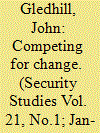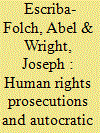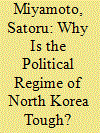|
|
|
Sort Order |
|
|
|
Items / Page
|
|
|
|
|
|
|
| Srl | Item |
| 1 |
ID:
111586


|
|
|
|
|
| Publication |
2012.
|
| Summary/Abstract |
When collective violence breaks out during periods of regime change, the root cause of that violence is ordinarily assumed to be a failure of state and/or governmental organizations, alongside transition. However, there are limits to the applicability of this understanding, since violence sometimes erupts during regime change, even when state and executive organs remain intact. This paper addresses those puzzling cases, by arguing that transitional violence can be a by-product of competition between, or within, a state's security services-for power and resources in an emerging regime. Competition develops where there is intense uncertainty about the form that the new regime might take and associated uncertainty about the distribution of power and state funds among state security services within that regime. The dynamics of transitional violence through intrastate competition are illustrated in the paper through treatment of two "most different" cases: Indonesia (1998) and Romania (1990).
|
|
|
|
|
|
|
|
|
|
|
|
|
|
|
|
| 2 |
ID:
075326


|
|
|
|
|
| Publication |
2006.
|
| Summary/Abstract |
While structuralist explanations for regime transition focus on domestic conditions in initiating democracy within the nation-state, I argue that exogenous events such as regime removal through foreign intervention are an important causal variable to democratization. Examining regime transition in Iraq, I use the comparative approach to show that where the United States imposes democracy upon a country, it is relatively successful. To explain this empirical finding, I posit that democratization is strongly influenced by the success of US military intervention and assistance during the transitional phase and positive socioeconomic conditions within the host country during the rebuilding stage. While regime removal through foreign intervention was a necessary condition for democratic transition in Iraq, the sustainability of democracy increases with strong economic growth and development, and controlling for the adverse effects of 'rentierism'. In this regard, I suggest the prospects of Iraq building and maintaining a competitive regime are cautiously optimistic.
|
|
|
|
|
|
|
|
|
|
|
|
|
|
|
|
| 3 |
ID:
139799


|
|
|
|
|
| Summary/Abstract |
Do human rights prosecutions deter dictatorships from relinquishing power? Advances in the study of human rights show that prosecutions reduce repression in transition countries. However, prosecuting officials for past crimes may jeopardize the prospects of regime change in countries that have not transitioned, namely dictatorships. The creation of the International Criminal Court has further revitalized this debate. This article assesses how human rights prosecutions influence autocratic regime change in neighboring dictatorships. We argue that when dictators and their elite supporters can preserve their interests after a regime transition, human rights prosecutions are less likely to deter them from leaving power. Using personalist dictatorship as a proxy for weak institutional guarantees of posttransition power, the evidence indicates that these regimes are less likely to democratize when their neighbors prosecute human rights abusers. In other dictatorships, however, neighbor prosecutions do not deter regimes from democratizing.
|
|
|
|
|
|
|
|
|
|
|
|
|
|
|
|
| 4 |
ID:
079905


|
|
|
|
|
| Publication |
2007.
|
| Summary/Abstract |
While evidence continues to mount that democracies resort to military force reluctantly, the transition to democracy may in fact be a dangerous and conflictual one. Given the emphasis now being put on democratization, a reassessment of the relationship between the stability of domestic institutions and interstate conflict seems fitting. To date, the evidence remains mixed. No clear consensus has emerged on whether regime transition either increases or decreases conflict propensities. Employing a logit specification with splines and robust standard errors, this research analyzes the conflict behavior of transitioning states for the 1950-2000 period. The results indicate that `rocky' transitions or democratic reversals increase the likelihood of conflict occurrence. I demonstrate, however, that this result is driven by the conflict behavior of autocratizing countries. An interaction term shows that although regime change itself may increase conflict propensities, such exacerbating effects are reversed for democratizing states.
|
|
|
|
|
|
|
|
|
|
|
|
|
|
|
|
| 5 |
ID:
090908


|
|
|
|
|
| Publication |
2009.
|
| Summary/Abstract |
The hypothesis that terrorism often emerges when mass collective action declines and radicals take up arms to compensate for the weakness of a mass movement has been around for some time; however, it has never been tested systematically. In this article the authors investigate the relationship between terrorist violence and mass protest in the context of the Spanish transition to democracy. This period is known for its pacts and negotiations between political elites, but in fact, it was accompanied by high levels of terrorist violence and popular mobilization. To test the hypothesis, the authors have created two data sets, one on victims of terrorism and another on participation in demonstrations. The data clearly confirm that terrorism erupted in Spain when participation in demonstrations started to decline. This result sheds new light on the nonstructural conditions associated with the onset of terrorist violence.
|
|
|
|
|
|
|
|
|
|
|
|
|
|
|
|
| 6 |
ID:
190458


|
|
|
|
|
| Summary/Abstract |
The purpose of this paper is to examine the stability and toughness of North Korea’s political regime from the perspective of radicalism and gradualism of the market economization. Since it is believed that gradualism keeps the regime stable. I examined the hypothesis that North Korea and Cuba effectively abandoned their socialist planned economy and introduced market economization after witnessing the economic crisis in China and Vietnam during the Cold War. As a result, North Korea and Cuba experienced the economic crisis and gradual economic development after the Cold War. The socialist planned economy remained an ideal in North Korea. Therefore, market economization became gradualism because of its suppression by the ideal in North Korea.
|
|
|
|
|
|
|
|
|
|
|
|
|
|
|
|
| 7 |
ID:
190459


|
|
|
|
|
| Summary/Abstract |
The purpose of this paper is to examine the stability and toughness of North Korea’s political regime from the perspective of radicalism and gradualism of the market economization. Since it is believed that gradualism keeps the regime stable. I examined the hypothesis that North Korea and Cuba effectively abandoned their socialist planned economy and introduced market economization after witnessing the economic crisis in China and Vietnam during the Cold War. As a result, North Korea and Cuba experienced the economic crisis and gradual economic development after the Cold War. The socialist planned economy remained an ideal in North Korea. Therefore, market economization became gradualism because of its suppression by the ideal in North Korea.
|
|
|
|
|
|
|
|
|
|
|
|
|
|
|
|
|
|
|
|
|